When Life Steals Your Joy, Love Heals: Becca Stevens & Dorris Walker
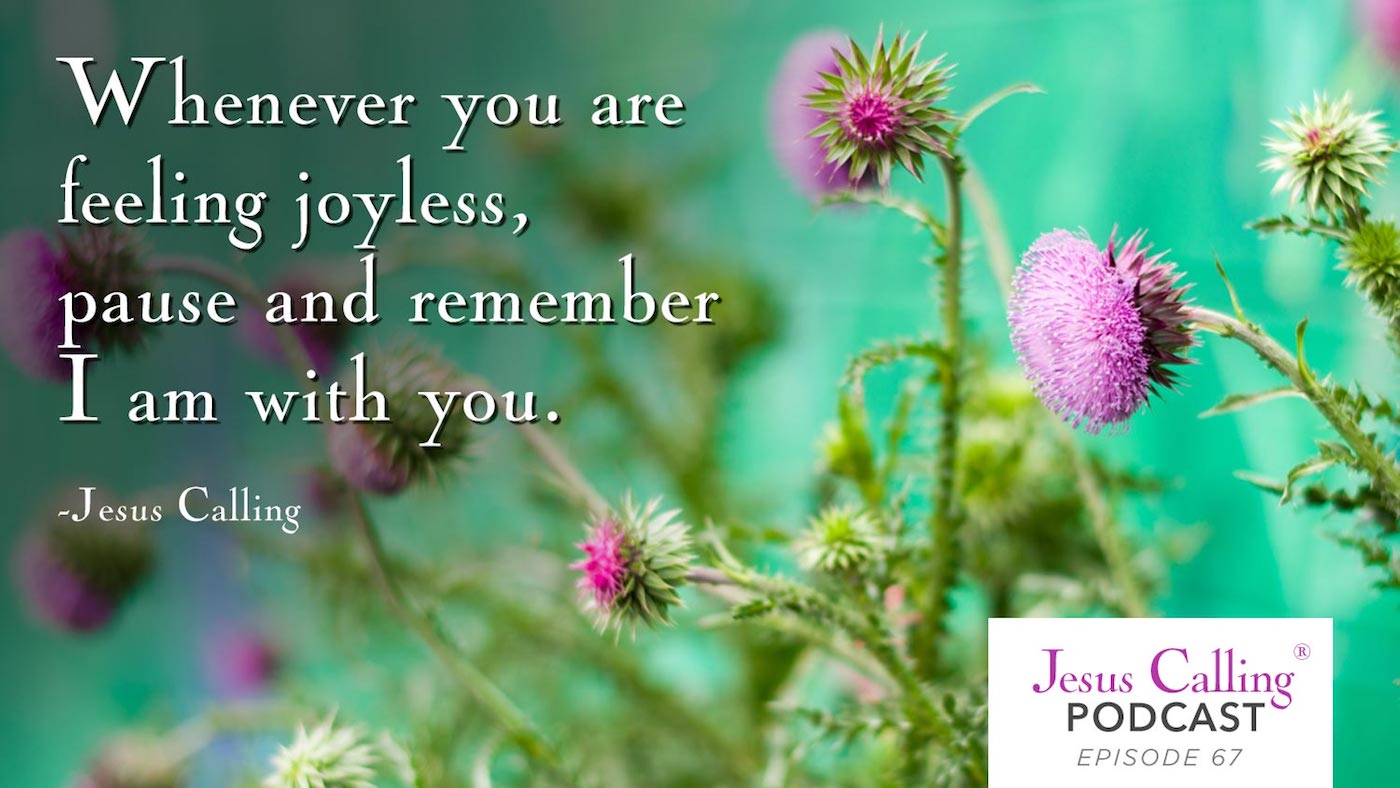
Becca Stevens is the founder and president of Thistle Farms, a beautiful justice enterprise for women who are survivors of trafficking, addiction and prostitution. After experiencing abuse and trauma in her own childhood, Becca longed to open a sanctuary for survivors offering a loving community. Twenty years later, the organization is thriving and continues to welcome women and provides housing, medical care, therapy and education for two years. She has written a book called “Love Heals” that details her experiences. One of the beneficiaries of the Thistle Farms program also talks about her experience with the program, Dorris Walker’s childhood was happy, until the day she witnessed her own father’s fatal shooting. She went from a happy family life to a life in the streets of Nashville, trading herself to support the addictions that numbed her pain. A concerned friend reached out to Dorris and brought her to Thistle Farms. Dorris shares the life-changing experience she had there, and how love truly does heal.
Narrator: Welcome to the Jesus Calling Podcast. Today, we talk with founder and president of Thistle Farms Becca Stevens. After experiencing abuse and trauma in her own childhood, Becca longed to open a sanctuary for survivors offering a loving community. In 1997, five women who had experienced trafficking, violence, and addiction were welcomed home. Twenty years later, the organization continues to welcome women with free residence that provides housing, medical care, therapy and education for two years. Becca shares the origins of Thistle Farms and how she put her mantra of “Love Heals” into action.
When Life Steals Your Joy, Love Heals: Becca Stevens & Dorris Walker – Jesus Calling Podcast Episode #67
Becca Stevens: I’m Becca Stevens and I am the founder and president of Thistle Farms, which is a beautiful justice enterprise for women who are survivors of trafficking, addiction and prostitution. We started over 20 years ago, and it was just a housing program; a place to find sanctuary, for women who endured so much and survived and said, “we want to be a place where you can learn how love heals.”
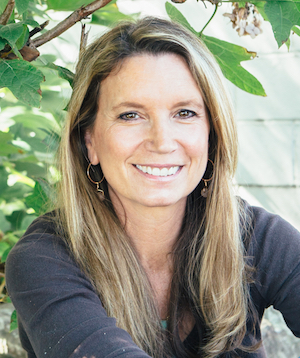
You know, my journey started out–my first memory is grief. My dad died. He was an Episcopal priest. He died when I was five years old. A drunk driver hit him. So joy has always been a big longing and a theme in my life. After he died, I had a great mom and four siblings, and we had a beautiful family. But a guy came in who was taking over and going to work at the church where my dad had been. And he really took advantage of our family and he started abusing me sexually, and beginning in the church, and it went on for years.
So I didn’t know a lot of joy. I traded my innocence for fear. The beautiful thing about my faith journey for me has always been that God has never been the issue. I never had that. I never wondered if God was there or blamed God. I always felt like my faith was my safe place. I had a lot of issues, believe me, and I was really lost and I needed a lot of forgiveness and mercy and all that, but it was never that my faith in God was shaken. I always feel like that was the biggest gift. That I could do everything that I needed to do in this world, and I knew that death and abuse was not going to be my story.
Somehow, I think I even knew as a little kid, I was stronger than the guy abusing me. He was the one that was going to be hiding in corners in shame. I wanted something else. I wanted to be about love, I wanted to be about how community could happen.
Calling Out To God
I don’t know that I ever understood my life as having a call. What I learned in my faith journey was that I was calling God a lot. I was calling out to God. Where I felt like I had some peace or an answer, that’s the direction I went in.
It wasn’t really like a clear path, it was these inklings or longings that I had. So, I knew that none of the systems were working for women. Putting them in jail and putting them in and out, on the streets, and off the streets, or halfway houses where they had to pay. On average the women that we serve are first raped between the ages of 7 and 11. They first go on the streets between the ages of 14 and 16 years old. If you put them in a halfway house and say you have to pay a hundred twenty-five dollars a week to live here, they have to hustle to get the money. It’s impossible to really transform your life and hustle. I knew that. I knew what I wanted to do, but I was like, but who has time to start something, right? I had one four-year old, and I was pregnant with my second child, and my husband was on the road. He had a record deal with Columbia Records.
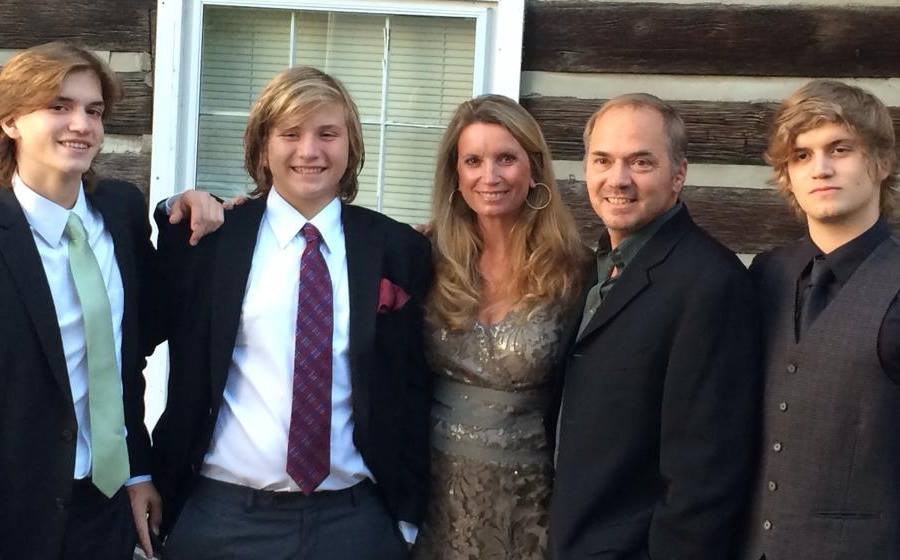
I was helping some women on the streets, and I had my son with me. I was done at work helping the women that were coming into this day center, and I was trying to put him in the car seat. You know kids that are four years old just arch their backs and they hardly get in. I was trying to do that pregnant and he all of a sudden said “Mom, why is that lady smiling?” Where I’d parked the car downtown to help the homeless folks, it was right near a strip club. There was this huge billboard out in front of it, that I had, I guess, just not thought about.
It was this lady dressed in a cat suit smiling. When my 4 year old asked me that question, it really broke my heart because I thought, “Someday he’s not going to ask that question. It’s going to fade into the landscape of what we do in our culture of buying and selling women; and probably for less than you can buy and sell a cat.”
It was that moment, that if I could attribute a thing to a moment of a calling, it was my son asking that question and I thought, “Okay, do it tomorrow. We’re going to open this place and he’s going to know he has a mom that respects and loves women and wants him to too, and that doesn’t see this as okay.”
And that was it. We started up.
Creating A Place Of Healing
So that’s what I did. I went through school. I got ordained and I was able to open the very first house for women that said, “Just come live two years. Don’t pay any rent, no authority in the house; just tell us what you need for healing.”
It took almost two years from that point: To get a board, to get the funding to open the house, and get it going. Five women came and they changed my life, and they changed–I think of them as the first pioneers–they changed the conversation in this country around women survivors. They’ve changed legislation and they’ve inspired thousands of people.
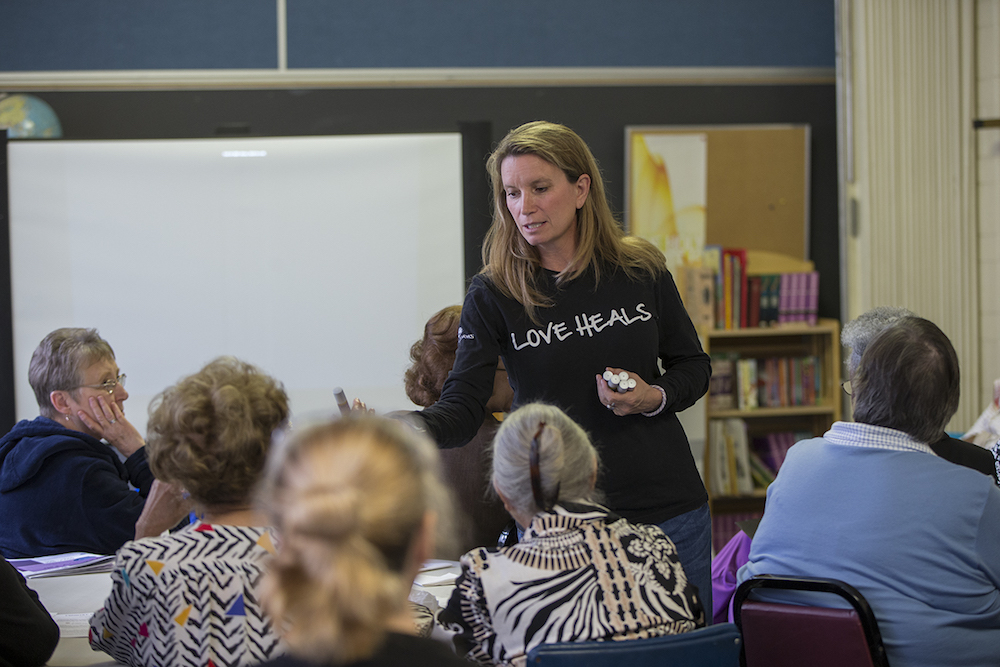
You can watch women who have never had jobs before come in here and learn what it means to take care of another worker. So healing, and so compassionate. You can see women who get to see their children again and get to reunite with their families. We see it all over the world. That’s not a story just of Nashville or the United States, it’s all over. When women come together in a circle, and they love without judgment, and they nurture the hope in each other, healing follows.
You know the issues of trafficking and abuse and violence against women are universal. But hope is universal and love is universal. When we come together and remember that, there is nowhere that love can’t heal. If we’re supposed to imagine what we would do if we had more and more sphere of influence in this world, it would be to create more and more of those circles or small groups of women who come together and help heal their whole communities.
Survival by Brutality: Tough Thistles
Women came and they were doing great work so we kept growing and we started a business making home and body products and then we started working with women overseas who have been survivors of trafficking. We started opening up communities around the U.S. We have 40 sister programs now around the country and we have 24 global partners.
I loved the idea of calling this company that we work with “Thistle Farms.” I loved it because when we would go down to the streets and alleys where the women were walking and sleeping and turning tricks, that’s the last wild flower that was left. The idea of claiming that as a symbol and remembering that thistles do have a “survival by brutality.” They have all kinds of reasons to fear. They’re tough. They can grow through concrete. They can survive floods and droughts. When we opened our first home, or began our first relationship with a group in Rwanda, we went to the memorial where 258,000 people were buried after the genocide. And sure enough on the edges of it, these thistles were growing.
But the other thing about thistles is they have that beautiful purple soft center. It reminds you of that scripture “Even Solomon in all his glory is not arrayed like one of these.” So we have all of that, all of us. We have these beautiful, soft, purple centers and we have these spiny thorns, that if you say the wrong thing, you might set them off. So it made sense to call it “thistles,” then “farms,” meaning we can grow.
The Gift of Community
So we would harvest thistle and make paper from that soft down, that strong fiber, and it was beautiful. It was a gift. I remember one winter trying to find more thistle because you know you just have to go scrounge it up. I found some on the side of the road and I was picking it, and this guy drove by and he slowed down. And he wasn’t slowing down in a scary way. He had this really concerned look on his face like, “What is this woman doing hunched over picking dead thistle in January?” I laughed and I waved him on.
I remember standing out in that field and just weeping and thinking it made sense, really, that this is where my life had ended up after the early death of my father and abuse, and after getting really lost and needing really a lot of forgiveness and mercy. Receiving this gift of the communities of Thistle Farms and Magdalene and doing this work–it led me on all these side roads and I got to be in a place where I could see a half dead field of thistle as beautiful.
I was so grateful. Not everybody gets to see the world that way. I just stood there and thought, “You know, I am a thistle farmer. I’ve become this thing.” And the whole world’s your farm.
So women make beautiful paper; it’s a great business model, it costs nothing. Our cost of goods are zero. When you make stuff out of thistle, everything goes back into the women’s pockets and keeps the residences open.
It’s been an incredible 20 years; and in many ways I feel like we’re just getting going. I mean there have been so many opportunities and we are so, so grateful.
Jesus Calling: Words Of Comfort
I love that in these books Jesus Calling and Jesus Always for today, both readings are about joy. I think one of the biggest gifts in this work is that 20 years later, what makes me weepy is not the horrific stories I hear, but the joy. When we come together in love, there’s always joy. I’m talking about women who have really come from the ashes of abuse, and despair, and prison, and refugees who have fled war, and violence of every kind we can imagine. They come together, and they find joy, and I get to be a part of it.
Sarah Young lives what she writes. She has been generous not only to this community, but to many communities with women healing. I really respect that the words that she writes are how she lives her life. That’s a great gift. I think women who come through this program can sense authenticity, and Sarah writes with authenticity. She writes with humility, and she writes clearly, and I love it. It has been an influence on many of the women who have come through the program. They’re looking for that thread of hope. They are looking for those moments of grace and those words of comfort. In both of these devotionals she offers that. They hang onto it and are grateful.
I’m taking it as a great sign that for today, September 5th both passages in the books are on joy.
This is a passage from Jesus Always September 5th.
“Whenever you are feeling joyless, you need to pause and remember, I am with you. I am watching over you continuously. I love you with a perfect, unfailing love. I have given you My spirit and this Holy Helper within you has infinite power. He can help you line up your thinking with the absolute truths of Scripture. My continual Presence is a Biblical promise. So seek to see Me in the midst of your circumstances. At first you may perceive only your problems, but keep on looking ‘til you can discern the light of My Presence shining upon your difficulties, reflecting sparkles of joy back to you.”
Love Heals: A Beautiful Book
You know along these twenty years, I’ve met so many people who have lost everything. I’ve met women who have been prostituted, beaten, jailed, who are homeless, who are addicted, who are living with a lot of shame, who have broken relationships. Still, none of that overcomes the possibilities and hope of how love can heal us. I believe that with all my heart. Whatever’s happened in our past, or whatever we’re going through right now, there is hope and there is always faith.
…we’re going to love you until you can love yourself. We’re going to preach love until we can hear it ourselves.
“Love heals” to me seems like the simplest and deepest mission statement you could have for an organization with a mission focus. It embodies everything; it takes a lifetime to live into it. Love heals came to us slowly as a community. You know we had a lot of words before, and after, and in between the words “love” and “heal” to start with. It takes awhile, sometimes, to shake and distill down to the core of what it is that you believe.
In the end, for us, it was “love heals.” We put it on every single product and we start off with that as a gift to the women that come through the doors and grace us to live for two years, with the idea that “we’re going to love you until you can love yourself. We’re going to preach love until we can hear it ourselves.”
The book Love Heals was one of the great surprises in my life. It was going to be a gift book, and we could fill it with beautiful images from this community of healing. With teacups that we had used, and oils that we had made—these healing oils—and thistles, all of those things. We could talk about daily practices in community, and ritual, and we could talk about grief, and addiction. Things that really hold people back, and also are the grounds for a lot of healing in people’s lives.
The book came together, and I loved writing it. It coincided with a break I took. I had a sabbatical after 20 years, and we went out West. I got to walk in some old, old forests and write poetry about healing and reflect on this work, like I hadn’t ever had a chance to do before. I look at this book; it is by far and wide the most beautiful book I’ve ever written and been a part of. The images in it, and the layout of it, and the call-outs, and the Scripture. It feels healing to me to read it. A lot of it is just a joy for me.
Never Let Hope Die
What we’ve got to do is keep hanging in there. We’ve got to keep reading inspirational things. We keep having to find communities where we can be safe to share that, and know that we can rebuild our lives. You can be in the middle of a refugee camp and start rebuilding your life, even without the hope of ever getting anywhere. You can be in a homeless shelter and start dreaming of how your life can be better. You can be in jail and pray. There are so many women here who are homeowners now, they are back with their children now. They have been 10-20 years of recovery without ever using a drug again. Things get better and we just can’t ever let that hope of how love heals die in us.
Dorris is one of the amazing survivors of Thistle Farms. She, in her own words, tells the story of being trapped on the streets for more than 10 years in a 10-block radius, and couldn’t find a way out. She, like most of the women we serve, had horrific childhood trauma, and saw the streets, and drugs, trafficking, and prostitution as a way to survive and escape at the same time. When she came, she was always both this dichotomy of joy and fear. She always sang gospel songs. She wrote songs for us and would sing them. They’re beautiful, I know she’ll play a verse and a chorus of her songs for you if ask her.
Most recently she and I were on a cruise together in January. And she stood out on these high seas and stood up in the middle of a pretty stormy day and sang her “Praising Jesus” songs. I kept thinking when she was up there singing: What if that voice had been silenced? How many people would have missed it? You know, she’s the director of all the national events for us; she organizes us to go all over the country. That voice is so clear and beautiful, and how it just takes a community to believe in somebody to help that voice find a home.
Narrator: To find out more about the work of Thistle Farms and about Becca’s book, “Love Heals”, please visit ThistleFarms.com.
Stay tuned as we talk to Dorris Walker, a graduate of Thistle Farms, as she shares her incredible story of how love truly does heal.
Are you looking for the perfect gift for a friend, family member or loved one who needs a little more peace and joy in their lives? Lifeway Christian Stores will be featuring Jesus Calling and Jesus Always for just $5.00 each –for one day only – Saturday, November 25th. Shop in any Lifeway Christian Store or go online to Lifeway.com to get your copies of Jesus Calling by Sarah Young, or the newest 365-Day devotional by Sarah—Jesus Always–for only $5.00 each on Saturday, November 25th.
Dorris Walker: A Story From Thistle Farms
Narrator: Next up on the Jesus Calling podcast, we speak with Thistle Farms graduate, Dorris Walker. Dorris’ childhood was filled with trauma, including watching her own father’s fatal shooting. Her pain was so severe, she found herself with a childhood addiction to marijuana, which grew into a full-blown addiction to crack cocaine. Dorris shares the story of how she spiraled into a life of trading herself to support her habit. And how a woman, who herself had graduated from Thistle Farms, extended a hand of help to Dorris that changed the course of her life.
Dorris Walker: I grew up in White House, Tennessee. I had an amazing childhood. That’s a little bit different than some of my sisters for life that we have in the program, because we come from all different types of backgrounds. There are some women who come into the program because they are sold into human trafficking at a very early age. I thank God that wasn’t part of my story. There are some ladies that come in the program, and it’s because they grew up in families where the mother and father were addicts, and they thought addiction was okay, but that wasn’t part of my story.
I actually had an amazing childhood. I grew up in White House, Tennessee. My mother and my father were humble believers in God. They would carry me to church. My mother taught me all there was to know about the Bible. My Dad taught me how to sing and I had an amazing childhood. Everything in my life was going great. Until one day, a very troubled family member came into our family home, severely injured my mom, and shot my father. Now, I’m 12 years old, and I didn’t know what to think about this because I grew up in a little town that was like Mayberry; nothing ever went on.
As long as I live, I have not been able to get that image out of my mind. I remember running over to my Dad; just as I got there, he fell, which resulted in my being partially trapped underneath my dying father. So my life as I’d always known it, died that day, right along with my Dad. I began to live in denial. I found myself having a childhood addiction to marijuana at the age of 13. By the time I was an adult, that addiction quickly progressed, and I was a full blown cocaine addict by the time I was an adult.
Losing Everything You Touch
That addiction led me to the streets of Nashville where I lived an inhumane life. I can remember walking the streets just to trade myself to get out of the hot, blistering weather. I can remember walking the streets and trading myself just to get out of the cold. Anything that was good and decent had been taken from me through my addiction. I remember going in and out of jail, and in and out of jail.
But I did remember how to pray. So I would walk down the street and I would recite the 23rd Psalm, and you know when you get to the end of the 23rd Psalm, it says, “And I will dwell in the house of the Lord forever.” I would cry out and I would pray and I would say, “God, if you would just get me, I promise You, I will dwell in the house of the Lord forever.”
My life was full as I said, of going to jail, and getting out of jail, and going to jail. After I said that prayer, I went to jail again. And this time I met a friend of mine that I had been on the street with, Regina. Now Regina was there in the jail system, but she was not there as I was–I was an inmate and she came in to bring a word of hope. I looked at Regina and she said, “Dorris, guess what?” She said, “I got my life back!” I said, “How did you do that?”
I would pray and I would say, “God, if you would just get me, I promise You, I will dwell in the house of the Lord forever.”
Regina said, “I found this program that’s designed for women just like us,” she said, “And I got my life back.” She said, “I’m going to give the number and when you get out, you call me.” So Regina gave me the number. When I got out of jail I did something a little different. Instead of going back to the streets, the way I’d always had, I went back to White House, Tennessee to my mom’s house.
I absolutely lost everything I touched–I couldn’t keep up with anything. So I took my daughter’s picture off of my mom’s wall and I scribbled Magdalene’s number on the back of it and I put the picture back up on my wall.
But eventually I returned to the streets. When I was there, my brothers and my sister said, “Dorris you know what, you’re killing our mom.” She said, “Every time there’s a lady found on the street and she’s left for dead and they don’t know who the woman is, my mom thinks it’s me. And she goes into a panic mode.” So they said, “Can you please, please just call our mom and let her know you’re okay?” I said, “Okay, I will.”
Lord, I Want You To Help Me
So after I returned to the street, I called my mom one day, and I’m so grateful I made that call. I said, “Hey Mom, this is Dorris. Just wanted to let you know I’m doing okay.” And I wasn’t. She said, “Dorris, I need you to do something for me.” She said, “If you can, come home to sing at our choir anniversary. We’re having our 25th choir anniversary and the songs that you sang as a child, and some of the new songs. We need you to come home.”
So I went home to my mom’s house just for a few days. I was tired. I was broken, so I would lay in my mom’s bed and I would sleep and I would rest. I could hear my mom out in the kitchen, and she would be cooking for me, and she would be praying over me, and I could hear my mom singing, “Oh Lord, I want You to help me.”
I could hear my mom just worshiping God and trying to get through to God for me. She would come in my room and she would feed me and I would get up in the afternoons and I’d walk up to the church for the choir rehearsal. So I’d practice the songs, and I’d come back down lay in my mom’s bed, and after about three days my mind began to clear up. I called Regina, I said, “Hey, Regina, guess what, I’m here in White House. Can you get me in that program you told me about?” This was in 2009. She said, “Dorris, I can’t right now. We have over 150 women on the waiting list. But if you would just please call me, I promise you I’m going to get you in.”
So that gave me a little bit of hope. That’s the first time in over a couple of decades I had any kind of hope. I kept thinking, “Alright, I might be able to get in this program.” So I would do the same routine. I would go to rehearsal, I’d come home and hear my mom out in the kitchen cooking, my mom out in the kitchen praying. My mom out in the kitchen singing, “Oh Lord, I want You to help me.”
A Place For You To Come In
I went to the choir anniversary and I sang, and I praised God. That was the first time in a long time I had done anything that was good and decent, and I loved it. I came back home, went to sleep that night. Then I called Regina the next morning. I said, “Regina can I come in?” She said, “I talked to the director and the director said she’s going to get you in, just keep calling us. Even if you go back to the street, call us every day; we’re going to get you in.”
So I stayed there a couple more days and I started getting discouraged and I called Regina and I said, “Regina you know what, I’m going back to the streets. I have using dreams every night and I just can’t do it.” She said, “No, Dorris don’t do it.” She said, “Come on in, we got a place for you.”
So I was so very happy and so blessed. On November 9th, 2009 I got into the Magdalene Program. When I walked through the doors, they didn’t say, “Okay Dorris, what have you been doing?” They simply asked: “What happened to you?” That was the first time in my life that I realized the childhood trauma was the thing that sent me into just a frenzy of using and being in denial. So I came to the program, and they sent me to therapy, they were taking care of me.
Jesus Calling: A Habit For Every Morning
When I first met Becca, I thought, that’s not who I thought it was. They talked about Becca, and I thought, this woman; I’m really afraid that she’s going to judge me. But I saw Becca and she was so sweet. She was so kind and she walked up and she said, “So what can we do for you?” I’ve never had anybody ask me that. Not, “What do I want out of you, Dorris,” but “What can I do for you?” So it was just a change to know that she truly cared.
When I first got to Magdalene, I started going to group. My mom died after I was in the program, about three months after I was in the program. The sisters held on to me so tightly that I stayed there. I made it through it. They taught me; every morning when you get up, do your meditation. So we went to a dinner–our church here in Nashville invited us to a dinner–and they passed out these little books and they were called Jesus Calling by Sarah Young and I loved the book. I started reading it.
I got in the habit every morning, I would get up and I would read Jesus Calling, and it was so plain. The woman that wrote the book, it was like she was speaking directly to me. It was like it was from God’s ears, to her ears, and from her ears, right to me. I loved the book–it was so plain. Then after she would say something that was so profound, at the end of it, she would have a Bible verse. So I could base it on the Word of God—because I know words have power—and I could base it on the Word of God. I love this book.
Give Your Worrying To God
When I started working here at Thistle Farms, I made enough money to put the app on my phone. So I’ve got Jesus Calling on my phone. I absolutely love it.
So here I am, after being in the program, and coming out of the program, and being in this community for nine years— I still keep the routine. I read Jesus Calling every single morning.
There’s one, I love all of them, but there’s one—let me pull it up on my phone because I have got it right here with me. I don’t ever get far from it.
September 8th, I read this passage, because I was just worrying. I was having a lot of worry about us getting ready to go into the busy season. “Am I going to be able to get enough events, what am I going to do?” And I was just worrying. I usually worry, and then after a while I’ll think, “Why don’t I just give it to God and go pray about it?” So I read this, and this was like it spoke right to me; it was a passage on worry.
Minimize Worry And Maximize Worship
It says,
“Worry is largely a matter of thinking about things at the wrong time. I have built into your brain the amazing capacity to observe your own fault. So it is possible to monitor your thoughts and make choices about them. To avoid wasting mental and emotional energy, timing is very important. If you think about certain things at the wrong time, for example, when you’re lying in bed, it’s all too easy to start worrying about ’em. This is why it is so helpful to monitor your thinking, instead of waiting until you’re deep in worry, you can interrupt your anxious thoughts and change the subject. I want you to discipline your mind to minimize worry and maximize worship.”
I gotta read that again. “I want you to discipline your mind, Dorris, to minimize worry and maximize worship.”
“This will require much ongoing effort. But you’ll find that it is the path to freedom. When you realize you’re thinking about something at the wrong time, a worrisome thought at a time when you can do nothing about it, take swift action. Tell yourself, “Not now,” and direct your mind elsewhere. The best direction for thinking is toward Me. Toward Me. Turn your thoughts toward Me, and I will give you rest. So I love that. I absolutely love it.
Turning Worry Into Worship
So I found out, that I can turn my worry into worship, and that’s what I do. When I start worrying about something now, I keep my radio on, and I keep it on Kirk Franklin’s praise music. Every time I start worrying, I’ll just start listening to music, and I start singing. You can’t do both. You can’t worry. You can’t have fear. You can’t do both at the very same time when you’re in the middle of praise. So I absolutely love Jesus Calling. As a matter of fact I’ve got Jesus Calling I’ve got Jesus Today. I just keep them downloaded. They are amazing. I love them. So this book, her wisdom, has gotten me through. It’s going to keep on getting me through because she attaches it to the Word of God, and I love it.
Addiction does not discriminate. It doesn’t matter if you grew up in a house where you were dirt poor. If you grew up being the richest kid that anyone knew; addiction just simply does not discriminate. I never would have thought living in a Bible-based home, that my life would have ended up the way it did. But I can’t say it ended that way, because God is so good, He’s turned everything in my life around.
We Love Each Other: Love Heals
I had two children, and I’m so grateful that my mom took my two children and she raised them. So they are believers in God, because she took that faith that she instilled in me and she passed it right along to them. I’m so grateful to my mom for that. I’m so very grateful to my mom.
I want everybody; I wish everybody could get it. We all go through trials and tribulations, we all have things that hurt us. But I think if you can just tell somebody–don’t hold on to it. I thought I was the only person that went through trauma. I thought I was the only one that saw something happened to their parents. Then when I got here, I found out it happens so a lot of us.
I realized that if I just hold on to the circle; because when you’re in a circle there’s always somebody in front of you to lead the way, there’s always someone behind you to catch you before you fall. I realized that we love each other. We absolutely love each other. Our stories are more alike than different. We call ourselves sisters for life after we go through the two-year program, because we bond. We bond and we love each other, so love heals.
It’s amazing how much of a comment I get when I wear my T-shirt that says love heals. I passed by people in the airport and they say, “That’s right, it sure does! Love heals, that’s a good statement.” They don’t know the depth of what “love heals” means. But just to see the word “love heals” because everyone knows, I hope: Love is God. What’s more healing than God?
Narrator: To learn more about the Magdalene residence and Thistle Farms, please visit ThistleFarms.com.
Narrator: Next time on the Jesus Calling podcast, we speak with Christine Caine who is an author, activist and international speaker. Christine’s primary passion is to make Jesus’ last command her first, by giving her all to see the lost saved and to build the local church – globally.
Christine Caine: Jesus said, “You will have trials in this life.” It is part of living in a fallen world. I think we look for perfect scenarios here, rather than understanding we’ve got a perfect Savior. If I didn’t need saving, and if my life wasn’t a mess, then why would I need Jesus? A lot of it is where we choose to focus. I love to live my Christian life fighting the Christian good fight of faith from a place of victory, rather than fighting for a victory.
Narrator: Hear more great stories about the impact Jesus Calling is having all over the world. Be sure to subscribe to the Jesus Calling Podcast on iTunes. We value your reviews and comments, so we can reach even more people with the message of Jesus Calling. And if you have your own story to share, we’d love to hear from you. Visit JesusCalling.com to share your story today.
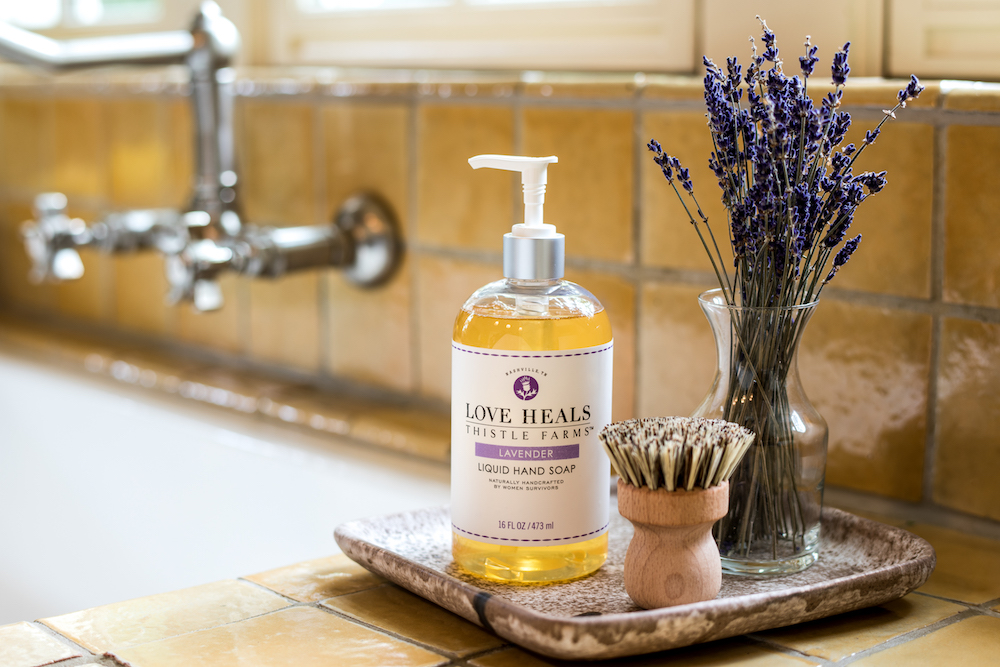
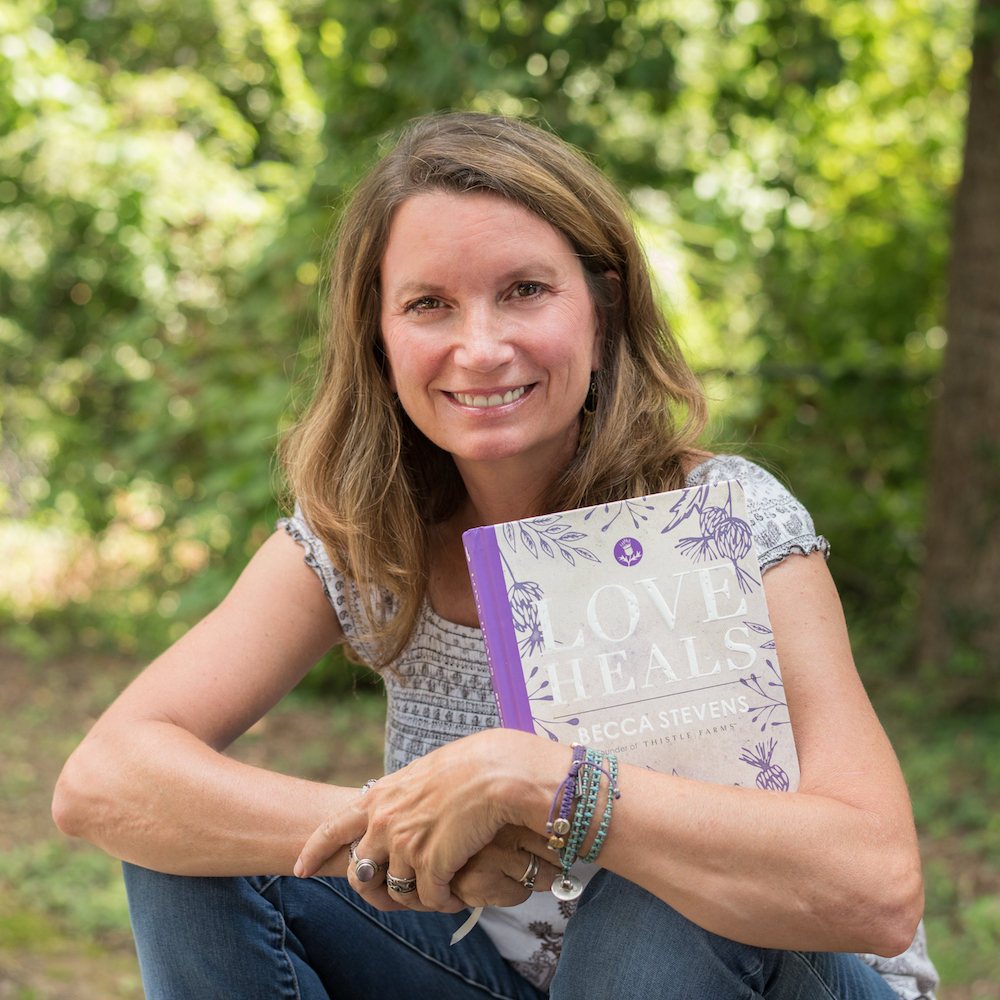
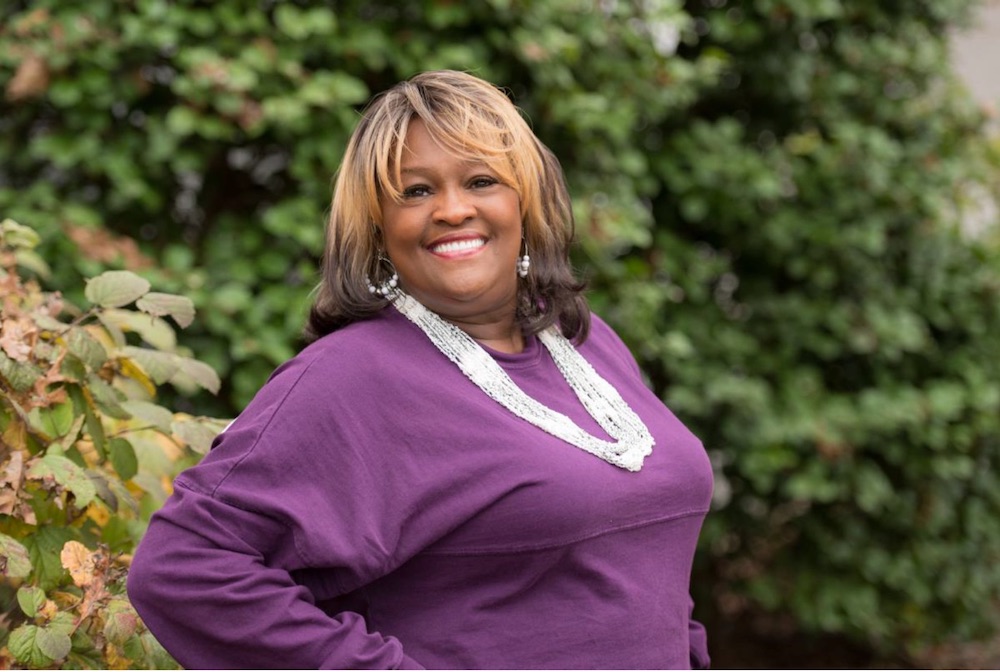
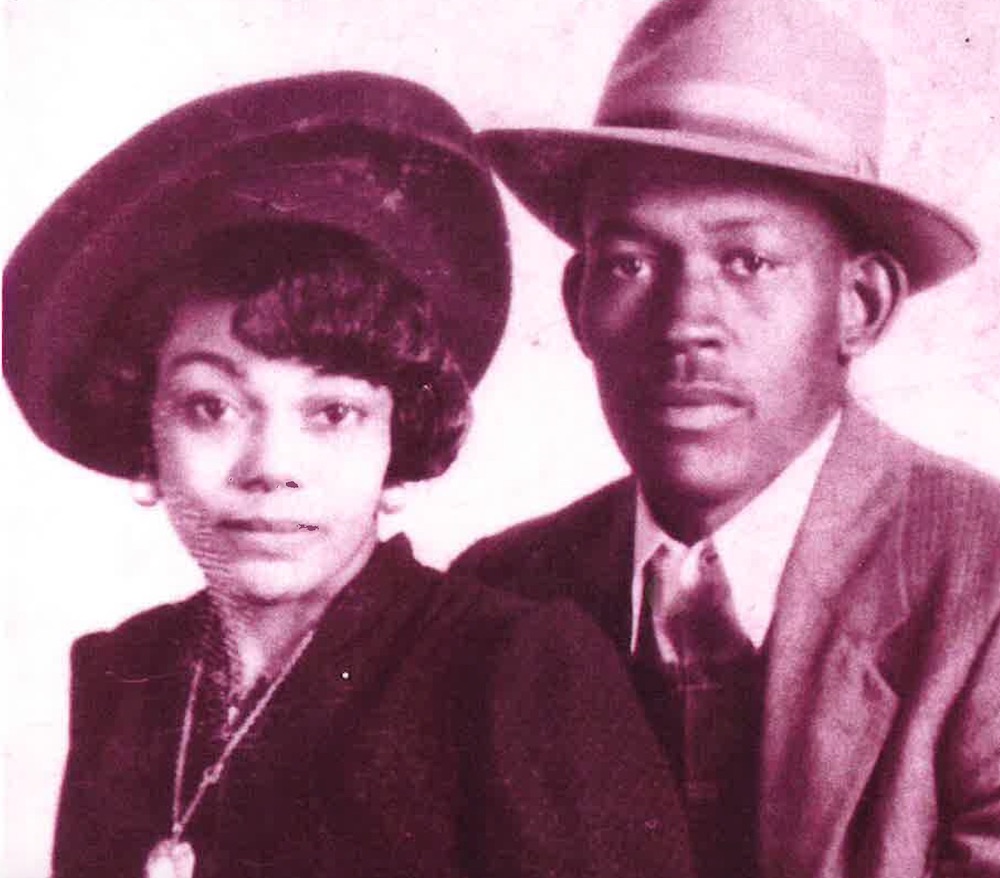
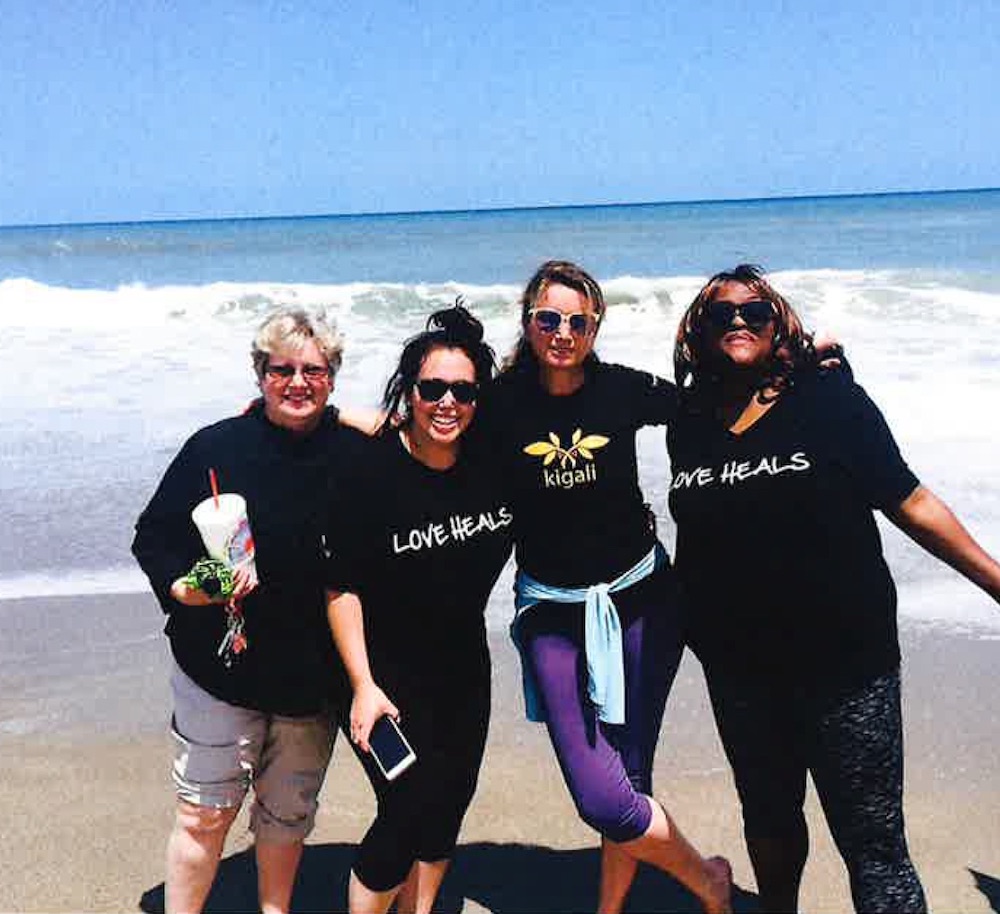


One thought on “When Life Steals Your Joy, Love Heals: Becca Stevens & Dorris Walker”
Comments are closed.